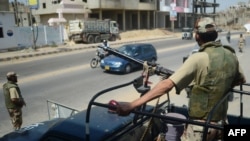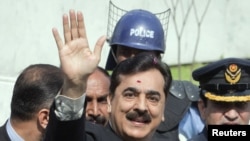ISLAMABAD —
Gunmen kidnapped the son of a former Pakistani prime minister on Thursday as fears of election violence were raised by a letter from the leader of the Pakistani Taliban revealing plans for suicide bomb attacks on polling day to undermine the vote.
Pakistani Taliban leader Hakimullah Mehsud, in a message to the group's spokesman, outlined plans for attacks, including suicide blasts, in all four of the country's provinces.
"We don't accept the system of infidels which is called democracy,'' Mehsud said in the letter, dated May 1, and obtained by Reuters on Thursday.
Since April, the al-Qaida-linked Pakistani Taliban have killed more than 100 people in attacks on candidates and rallies, particularly those of secular-leaning parties, in a bid to undermine elections they regard as un-Islamic.
The attacks have prevented candidates from the three main parties in the ruling coalition from holding big rallies. Instead, they have relied on door-to-door campaigning or small meetings in homes or on street corners.
Gunmen kidnapped the son of Yusuf Raza Gilani, former prime minister and stalwart of the outgoing Pakistan People's Party (PPP), as he was headed to a small political gathering In the central city of Multan, police said.
Ali Haider Gilani's secretary and guard were shot dead in the attack.
Militants spare main opposition party
The Pakistani Taliban have not attacked the main opposition party led by former Prime Minister Nawaz Sharif, which has courted support from groups accused of supporting militancy.
Sharif, who is seen as favorite to become the next prime minister, says Pakistan should reconsider its support for the U.S. war on Islamist militancy and suggests he would be in favour of negotiations with the Taliban.
Nor have the Taliban attacked former cricketer Imran Khan's party, which advocates shooting down U.S. drones and withdrawing the Pakistani military from insurgency-infested ethnic Pashtun areas along the Afghan border.
The letter from Mehsud is bound to raise fears of attacks during the historic vote.
Pakistan's military said on Thursday it would send tens of thousands of troops to polling stations and counting centres to prevent the Taliban from disrupting the election.
The polls, already Pakistan's most violent, marks the first time that a civilian government will complete a full term and hand over to another administration.
The Taliban are blamed for many of the suicide bombings across Pakistan, a nuclear-armed strategic ally.
Army spokesman Major General Asim Bajwa said 300,000 security officials, including 32,000 troops, had been deployed in Punjab, the most populous province.
"Definitely they have reports and obviously they have made a plan to counter that,'' newspapers quoted him as saying, referring to security agencies getting threats of violence from the Taliban.
Another 96,000 security forces would be deployed in the northwest of Pakistan, where the Taliban operate from strongholds.
Sharif's Pakistan Muslim League (PMLN) has capitalised on widespread frustrations with the outgoing government led by the Pakistan People's Party (PPP).
The military has ruled Pakistan for more than half of its 66-year history, either through coups or from behind the scenes.
Pakistani Taliban leader Hakimullah Mehsud, in a message to the group's spokesman, outlined plans for attacks, including suicide blasts, in all four of the country's provinces.
"We don't accept the system of infidels which is called democracy,'' Mehsud said in the letter, dated May 1, and obtained by Reuters on Thursday.
Since April, the al-Qaida-linked Pakistani Taliban have killed more than 100 people in attacks on candidates and rallies, particularly those of secular-leaning parties, in a bid to undermine elections they regard as un-Islamic.
The attacks have prevented candidates from the three main parties in the ruling coalition from holding big rallies. Instead, they have relied on door-to-door campaigning or small meetings in homes or on street corners.
Gunmen kidnapped the son of Yusuf Raza Gilani, former prime minister and stalwart of the outgoing Pakistan People's Party (PPP), as he was headed to a small political gathering In the central city of Multan, police said.
Ali Haider Gilani's secretary and guard were shot dead in the attack.
Militants spare main opposition party
The Pakistani Taliban have not attacked the main opposition party led by former Prime Minister Nawaz Sharif, which has courted support from groups accused of supporting militancy.
Sharif, who is seen as favorite to become the next prime minister, says Pakistan should reconsider its support for the U.S. war on Islamist militancy and suggests he would be in favour of negotiations with the Taliban.
Nor have the Taliban attacked former cricketer Imran Khan's party, which advocates shooting down U.S. drones and withdrawing the Pakistani military from insurgency-infested ethnic Pashtun areas along the Afghan border.
The letter from Mehsud is bound to raise fears of attacks during the historic vote.
Pakistan's military said on Thursday it would send tens of thousands of troops to polling stations and counting centres to prevent the Taliban from disrupting the election.
The polls, already Pakistan's most violent, marks the first time that a civilian government will complete a full term and hand over to another administration.
The Taliban are blamed for many of the suicide bombings across Pakistan, a nuclear-armed strategic ally.
Army spokesman Major General Asim Bajwa said 300,000 security officials, including 32,000 troops, had been deployed in Punjab, the most populous province.
"Definitely they have reports and obviously they have made a plan to counter that,'' newspapers quoted him as saying, referring to security agencies getting threats of violence from the Taliban.
Another 96,000 security forces would be deployed in the northwest of Pakistan, where the Taliban operate from strongholds.
Sharif's Pakistan Muslim League (PMLN) has capitalised on widespread frustrations with the outgoing government led by the Pakistan People's Party (PPP).
The military has ruled Pakistan for more than half of its 66-year history, either through coups or from behind the scenes.







